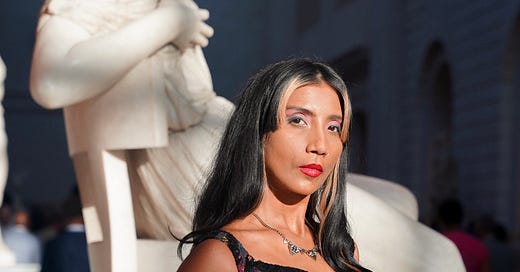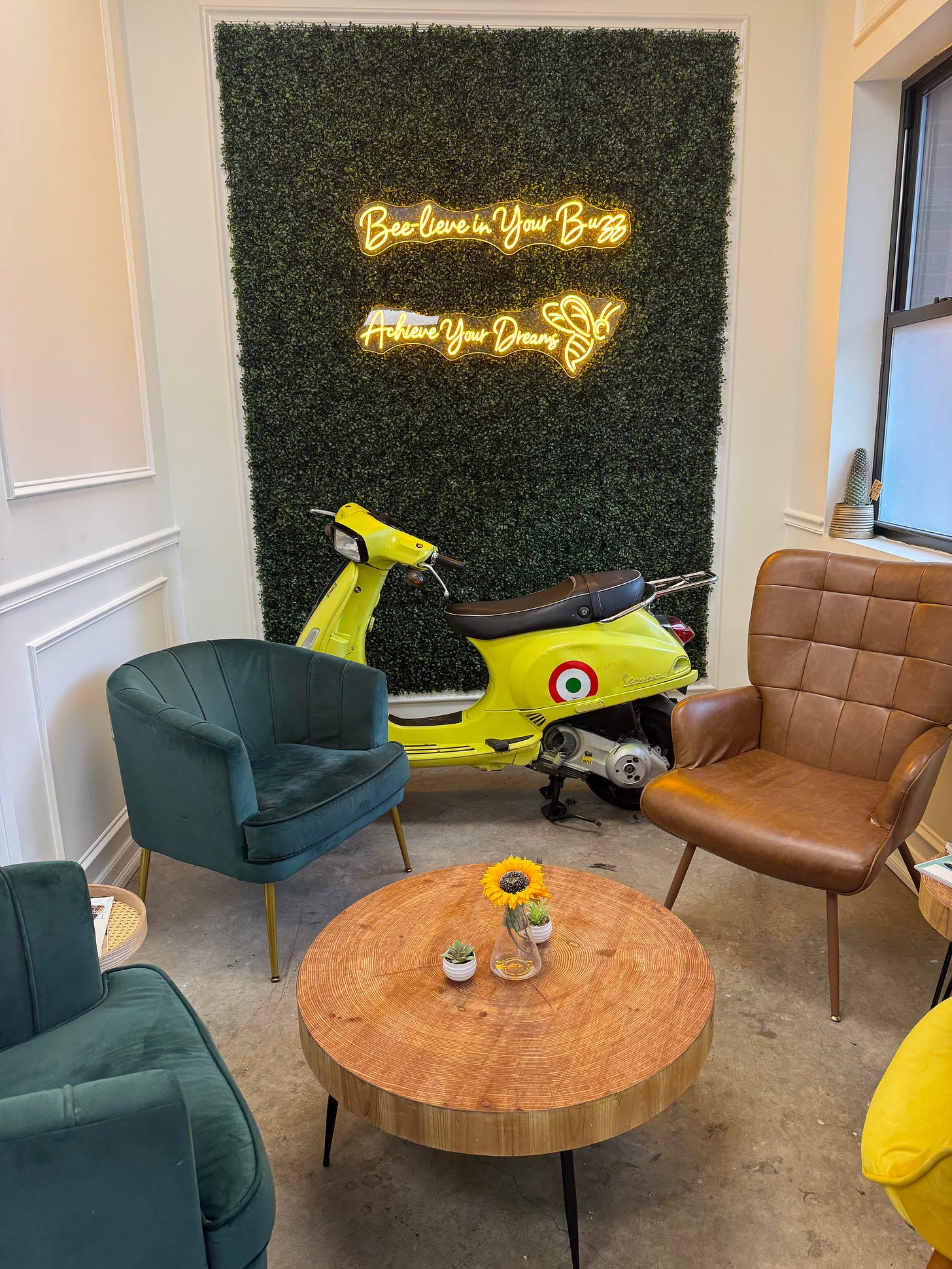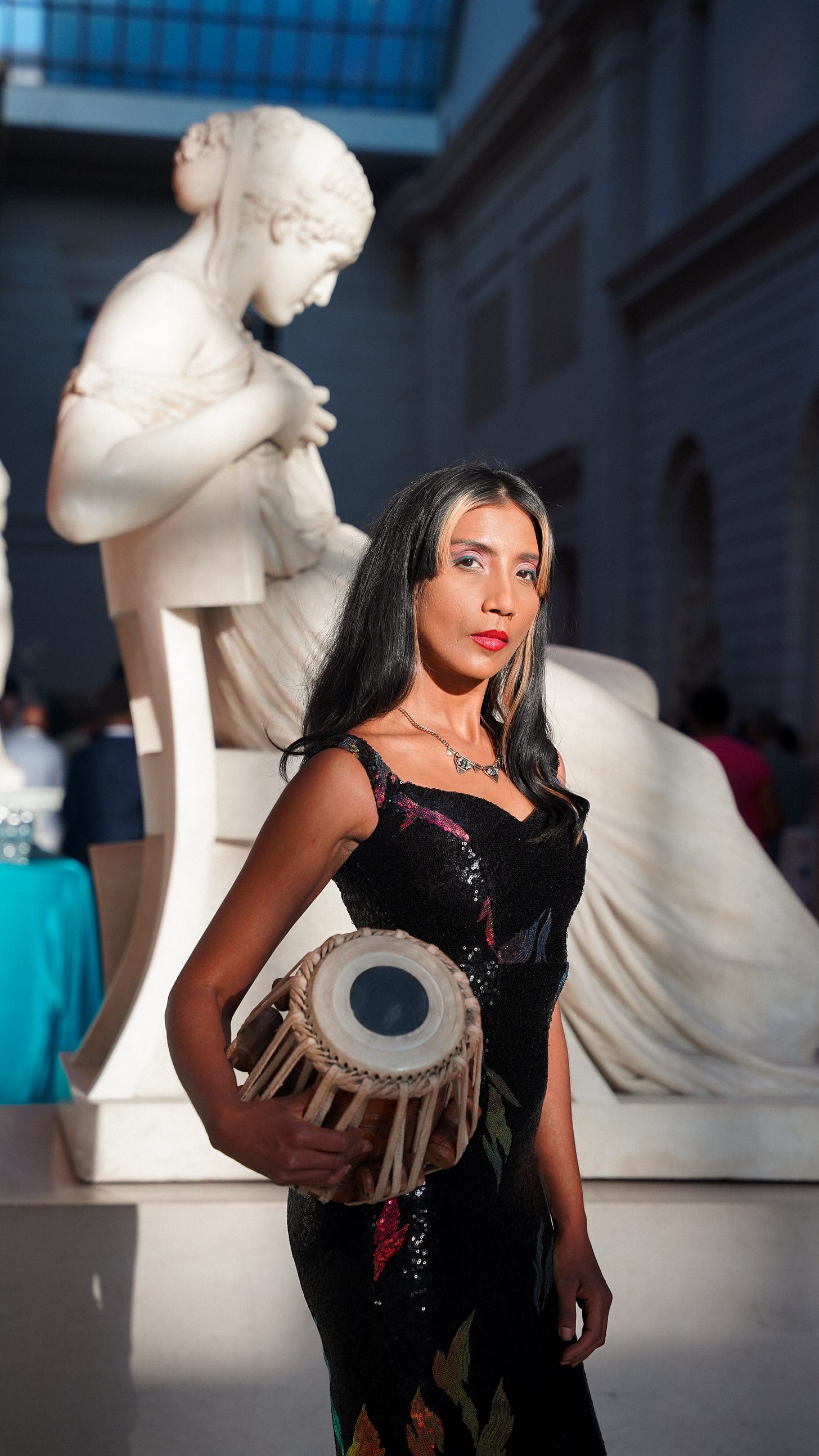Back in June of 2024, while searching for artists for one of our series, Roshni was recommended to me by a friend. Her first Flushing Town Hall performance, Mini-Global Mashup: Brazil Meets Trinidad/Tobago, took place on Sunday, September 29th, 2024. Sadly I was unable to attend, so I was super eager to meet her in person ahead of the upcoming Indo-Constellations: Rāginī Festival x Flushing Town Hall's First Mini-Global Mashup Festival on Sunday, March 23rd. As a multi-hyphenated artist, I thought she would be great for my first crack at this project, where, amongst other writing, I’ll spotlight different creators periodically. What followed was a great and easy conversation amongst artists.
Here’s a clip from that show I missed, with Roshni Samlal on tabla accompanied by Camila Celin on sarod. Check out the full video here.
I met up with Roshni on a frigid February evening at Flushing Town Hall’s staff favorite local café, Busy Bee. We got there a little under an hour before they closed, so we each got a couple of hot beverages served in big cappuccino mugs, and sat next to their decorative vespa, in hopes of getting to the bottom of all this arts business.
Growing up in her native Trinidad, Roshni learned music from her father, who was her first music teacher and was also once her mother’s music teacher. As an only child, Roshni describes her father getting up every morning at 5am and singing. In their lives, music was what Hinduism and yoga practices refer to as sadhana; a lifelong practice that requires patience and development. Singing was a daily commitment regardless of occasion. Whether it be a wedding or a funeral, it was always a practiced discipline that became spiritual. Her approach to art was deeply informed by watching her father put mind and body through the rigorous exercise of his daily practice.
As an only child with overprotective parents, Roshni got lost in books and audio, and became obsessed with recording other people read stories. When her family left Trinidad for New York, she remembers that one of the only things her family brought with them was their collection of cassette tapes and compact discs, which became an informal archive of their lives. Sound is how Roshni connects back to everything that was, that’s now gone. So much so that when she first arrived in New York, she was so sad about leaving Trinidad, that she couldn’t listen to old Calypso and old film songs, or it would evoke a palpable physical reaction of sadness.
Music is a major part of Trinidad’s national identity. There is always a sound to mark an occasion. Steelpan, Calypso, Soca and Chutney takes her right back to her Auntie’s Christmas gathering, or a funeral procession with a Mic Man making a death announcement before playing the song that hits you in the chest. Everything has a music to mark the dial. You know the bread van or fish van is coming around because you hear their speakers from a distance. Every year there is an expectation that there will be a new body of sound for Carnival. You can hear it in Flatbush or other neighborhoods in New York, but in Trinidad those songs are ubiquitous and quotidian. When Roshni sits in a Caribbean Airlines plane and hears the steelpan, she can feel the air and smell home. She immediately knows exactly where she’s going. Whether it be in maxi taxis, Bollywood radio, or radio for Hindu aunties who want Bhajans and folk songs; or DJ wedding trucks with a wall of speakers, the sounds are a part of the natural landscape.
Besides being a virtuoso tabla player, Roshni is a DJ performing under the name DJ Raat Ki Rani. I myself began DJing at the age of 13, playing Jehovah Witness parties in the Bronx, so I was very interested in exploring Roshni’s DJ journey. When she was a high school student in New York, she’d cut school and find solace at the Queens Public Library, where she would pore over their foreign film and CD collections. The QPL is where she discovered global music genres and began collecting them and making playlists. The obsessive collecting of sounds came from her dad’s influence, collecting Ghazal, Thumri, Classical and other genres. Collecting music is a DJ’s greatest gateway drug. In 2015 Roshni put her collection to use. She’d perform tabla for the Rubin Museum’s Spiral series, and when they were looking for DJs for their lounge, she began an informal residency. Ten years later, Roshni’s first Flushing Town Hall DJ set is coming up, and I'm super excited to cut all the rugs.
Join us at Flushing Town Hall for Indo-Constellations: Rāginī Festival x Flushing Town Hall's First Mini-Global Mashup Festival, on Sunday, March 23rd, at 5pm. It features performances by Ben Parag, Josanne Francis, Fijiana, and will culminate with a set by DJ Raat Ki Rani.
Visit our website for tickets and more info.
Roshni Samlal is a New York-based tabla player and DJ who has studied within the Farrukhabad, Benares and Punjab gharanas or schools of Indian classical percussion. Roshni is now a prolific local teacher and performer, both in traditional, soloist repertoire, as a classical accompanist (Pt. Krishna Bhatt, Steve Gorn, Sobroto Roy Chowdhury) as well as within a variety of jazz, experimental and chamber ensembles (In D Ensemble, Arkinetics, Orakel.) Roshni also explores electronic production as a narratorial context for tabla solos, incorporating poetry and sound collages that speak to topics of indentureship, post-colonial Caribbean identity, migration. She is the curator and producer of the Ragini Festival which focuses on spotlighting the work of artists engaged in traditional folk and innovative arts within the further reaches of the South Asian diaspora, focusing on Indo-Caribbean heritage. Roshni crafts DJ sets influenced by her Indo-Caribbean diaspora heritage, experiences as a working-class, brown immigrant during the 90’s, focusing on Asian Underground music, Global Club, Soca and Chutney.







